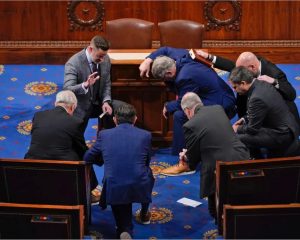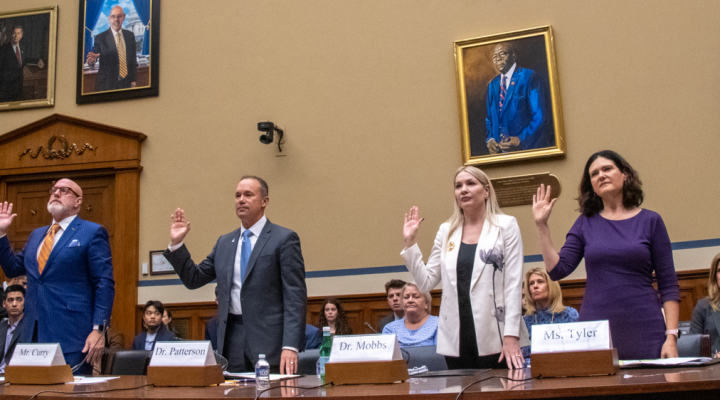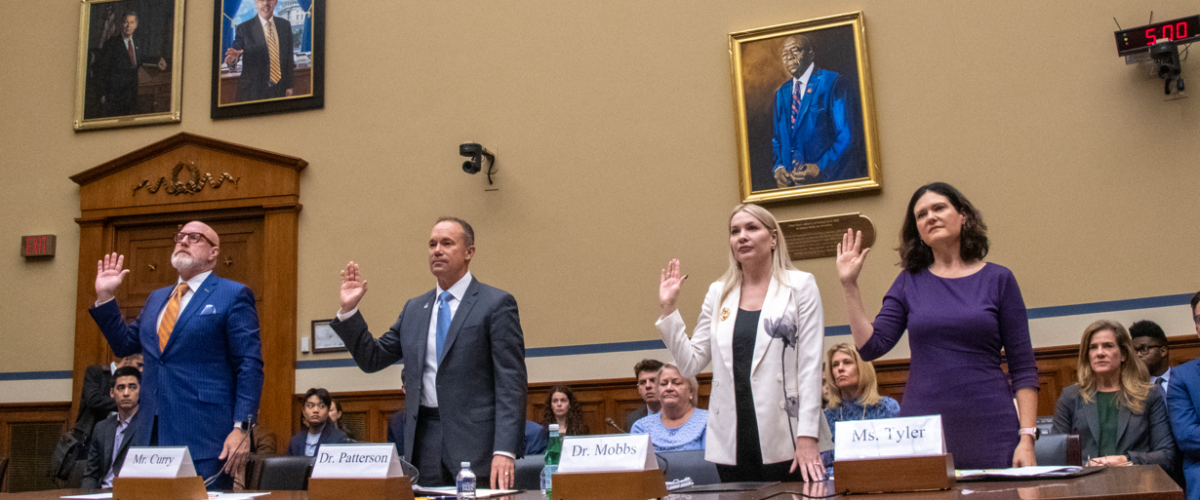Amanda Tyler, executive director of Baptist Joint Committee for Religious Liberty, warned members of Congress that attacks against faith freedom at home and abroad present a threat to national security and to American democracy.
“Religious freedom is at a crossroads today,” Tyler said Oct. 25 in sworn testimony before the U.S. House Oversight Subcommittee on National Security. “Religious persecution around the world, coupled with a resurgence of Christian nationalism at home, means we must redouble our efforts to protect religious minorities and the non-religious both domestically and globally.”
Tyler was one of four expert witnesses called by the subcommittee to describe the state of international religious freedom and persecution, including in high-profile violators such as China, Iran, Nigeria and Iran. But the attorney and Baptist leader repeatedly emphasized the importance of confronting threats to religious liberties domestically to provide a more effective example internationally.
“As we examine religious persecution globally, I hope we will also examine how well we are living up to this value at home. The single greatest threat to religious liberty in the United States today, and thus to our reputation as leaders in the fight for religious liberty to the rest of the world, is Christian nationalism,” said Tyler, lead organizer of Christians Against Christian Nationalism.
“The single greatest threat to religious liberty in the United States today, and thus to our reputation as leaders in the fight for religious liberty to the rest of the world, is Christian nationalism.”
She described Christian nationalism as a political ideology and cultural framework that attempts to merge American and Christian identities in order to privilege Christians and Christianity in U.S. policy and law.
The hearing included witness testimony and comments from subcommittee members about the ongoing repression of minority faith groups in nations where governments are closely aligned with Christian, Muslim and Hindu leaders. Those situations should be a warning against creating an official religion in the United States, Tyler said.
“We see what happens when religious nationalism in a country is allowed to flourish and use the power of the state to attempt to force a set of religious beliefs or create only one accepted form of religious belief.”

This photo currently circulating on social media is not from this week but from January. U.S. Rep. Greg Steube posted it on Facebook with this description: “In January, Mike Johnson joined me on the House floor while we were in a deadlock over who our next Speaker would be. We lifted up the speaker’s race to the Lord and asked for his divine guidance. Immediately after the prayer, 14 members changed their votes, ultimately leading to Speaker McCarthy securing the gavel by the end of the day. Mike Johnson is a strong conservative, but above all else, he is a strong Christian. He’s not afraid to look to his faith for guidance. America needs that more than ever in the U.S. House. I look forward to voting for Mike Johnson as our next Speaker.”
That’s why U.S. Rep. Marjorie Taylor Greene’s declaration that she is proudly Christian nationalist is so alarming, Tyler explained. “All of us who care about religious freedom should be able to quickly and definitively reject Christian nationalism.”
Tyler praised the Biden administration’s 2021 overturning of Donald Trump’s Muslim ban, which the former president has vowed to reinstate if reelected. She also lamented overt expressions of American antisemitism and Islamophobia that have erupted since the beginning of the war between Israel and Hamas earlier this month.
Policies like the Muslim travel ban are a stain on America’s long history of hospitality “and can have an impact national security and our ability to advocate for religious freedom in other countries,” she said.
U.S. Rep. Maxwell Frost, D-Fla., said he is disturbed by Christian nationalist rhetoric in Congress and efforts to use Christian language and concepts to promote an anti-democracy agenda.
“As a man of faith, I know that Christianity is not Christian nationalism.”
“I want to start off by saying I’m a man of faith. I was raised Southern Baptist. I love potlucks,” he said. “This is a huge part of my life and part of the reason why I’m so passionate about it. As a man of faith, I know that Christianity is not Christian nationalism. I oppose my faith being used to whitewash a racist, violent and dangerous ideology.”
Frost asked Tyler to explain how religious extremism threatens the American way of life. Religious nationalism, she responded, can “be co-opted by those in power to enforce a certain religious viewpoint on everyone else, and that’s why it’s such an urgent threat to religious freedom.”
The ideology also poses a danger to Americans because it promotes the use of violence to achieve religious and political ends, she said. “We saw that on Jan. 6 in the way that Christian nationalism was used as a permission structure and as a uniting ideology for people who were here at the Capitol that day in search of a political cause that was then infused with religious fervor.”
Christian nationalism also overlaps and provides cover for white supremacy and racial oppression “because the Christian in Christian nationalism is not so much about theology as it is about an ethno-national identity.”
Frost asked how incidents like the 2018 Tree of Life synagogue shooting in Pittsburgh, the 2015 anti-Black massacre at Emanuel AME Church in Charleston and other mass killings are an expression of Christian nationalism.
“All those examples are what happens when this ideology of Christian nationalism is used by white supremacists who try to justify their violence,” Tyler responded. “It uses the symbols and the language of Christianity to try to justify what is indefensible. And it turns their hatred into a religious cause and into something that they believe is ordained by God.”
U.S. Rep. Jamie Raskin, D-Md., asked Tyler to elaborate on the portion of her opening remarks dedicated to BJC’s concerns about blasphemy laws around the world.
She explained that a third of the world’s nations have blasphemy or apostasy laws which, when used, stifle religious expression and violate human rights by fostering intolerance, discrimination and violence across religious traditions. “Blasphemy laws don’t only hurt the religious freedom of religious minorities in those countries, but also of co-religionists because they try to enforce a single view of religion.”
U.S. Rep. Dan Goldman, D-N.Y., asked what Congress can do to counter the trends Tyler presented to the subcommittee.
The response must begin with improving the rhetoric used on Capitol Hill around contested issues and by defending the separation of church and state, she said. “It’s important that we as a country live up to the values that we have established in our Constitution, and also that we don’t use rhetoric that dehumanizes other people, that we don’t claim that God is on the side of any of any side of any war, and that we take care of civilians and we don’t equate civilians with the governments of their countries.”
Congress also should resist any effort to use religion to justify a particular form of government or specific policies. Otherwise, hatred and violence will continue to spread, Tyler said.
“Faith is indeed under fire around the world, and the best way that we can make a difference is by not adding more fuel to the fire of religious extremism and nationalism. Instead, we should focus on being a role model to the world by ensuring the institutional separation of church and state which protects all of us.”
Related articles:
Johnson called ‘the most unabashedly Christian nationalist speaker in history’


